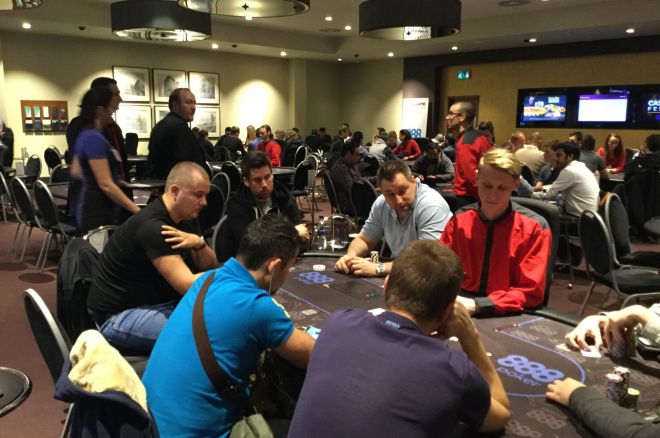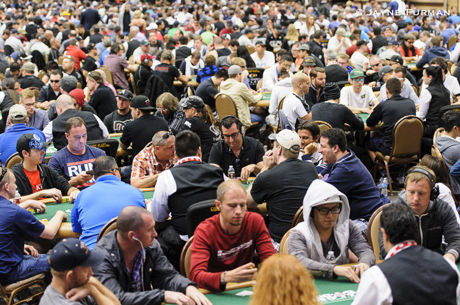Don't Make These 5 Mistakes in Small Stakes Cash Games

Small stakes cash games �� whether live or online �� can be profitable, but only if you're able to avoid the following much too commonly made mistakes.
Mistake #1: Fancy Play Syndrome
Fancy play syndrome is trying to pull too many moves on a simple-minded opponent. Let's be honest, when you are playing $1/$2 at the local casino or $0.05/$0.10 blinds online, your competition is not always world class. In fact, a lot of the time, they are either total beginners or just one step removed from that.
When you make that four-bet bluff preflop with ace-rag in order to "merge your range," this is going to go completely over their head most of the time. They will just call you down with their pair of tens and you will often lose to a superior hand. The same thing goes for trying to run big, creative bluffs after the flop against low limit players.
Often you have very little history with these players and your 10th-level thinking is just going to be completely lost on them. There are opportunities to make plays here and there in small stakes cash games, but by and large success comes from just playing by the book.
Mistake #2: Short-Term Thinking
One of the classic mistakes that players at the micros make is thinking too much about the short term, and forgetting the long term. Your aces got cracked three times in a row? Aces must be a terrible hand. We better just limp and play a small pot next time! Ran into a higher flush a few times lately? Small flushes must be a terrible hand. We better play it more cautiously next time!
I hope you can see the egregious mistakes in thinking here. Aces are obviously a great hand and will be a massive long term winner for you �� your biggest winning hand, in fact �� which is why you should always play them strongly. Flushes also make us a lot of money and should also be played strongly.
The mistake here is getting too wrapped up in the short term. Crazy stuff is going to happen in this game over small sample sizes. Don't let it cloud your thinking and alter your better judgment.
Mistake #3: Slow Playing and Under-Betting
Most players in small stakes cash games are passive. This means that a lot of the time �� unless you happen to cooler them massively �� the only way that you are going to win a big pot against them is if you build it.
Checking your two pair on the flop and turn to get "tricky," or betting 30% of the pot in such spots to keep from "scaring them off," are not effective ways to build a pot. Another key hallmark of small stakes players is that they like to call a lot if they have something that they consider good, giving you all the more reason not to check or bet small with your two-pair hands.
Just because you bet big with your big hand and they folded a couple times in a row, that doesn't mean that slow playing and/or under-betting the pot are superior plays. (Once again, this would be an example of letting short-term thinking overwhelm your thought process.)
The key thing that you need to realize is that while small stakes players are passive and they love to call, they still have to have something to do so. Most of the time in this game nobody has anything at all. Don't make the mistake of blaming your aggressive actions on players folding to your bets.
If you bet big with your good hands, you will simply win bigger pots at these stakes. If they fold, it was because they didn't have anything. Getting trappy or under-betting the pot is not going to solve that for them. Make sure that you are always making effective value bets at the lower stakes and you will profit the most.
Mistake #4: Overvaluing Top-Pair Hands
A big mistake a lot of people make at the lower stakes is overvaluing their top-pair hands. Top pair is a fantastic hand in limit hold'em, but in NLHE when the pot gets significantly big, it is often the case that somebody has two pair or better.
Since we know small stakes players are typically passive, you want to look out when they start raising you in a big way, especially on the "big money" streets (the turn and the river). This means that they want to play a big pot.
Trust me, the large majority of the time, they aren't bluffing. They are trying to take you to value town instead. Versus the tight regulars at these stakes in particular, it is important to respect their aggression in spots like this. If you can learn to throw away top pair in these situations from time to time, it will save you a lot of money in the long run.
Mistake #5: Getting Tilted by the Weaker Players
Bad players are going to give you more bad beats than anyone else. This is because they like to chase every draw, stick around with every bottom pair, and sometimes even stay in hands with nothing at all. At the small stakes there are more bad players than at any other limits. So it is very important that you learn how to deal with bad beats.
Simply accept that bad beats are a part of the game. If the weaker players could not get lucky once in a while, then they would not keep coming back again and again. Then the game would cease to be as profitable.
Note also that qualifier, though �� they get lucky "once in a while." We tend to have mass amnesia about all of the times that they miss their ridiculous draw and we win a nice-sized pot off of them. And we make a huge deal out of the couple of times when they hit something silly and scoop the pot.
Once again this is another form of short-term thinking. The bottom line is that the weaker players are often fighting a huge uphill battle versus the fundamental mathematics of the game. They cannot win in the long run when playing the way they do.
Final Thoughts
It doesn't take some kind of super genius to beat small stakes cash games. These games are still by and large relatively easy and chock full of bad players and weaker regs even in 2016. The biggest reasons why most people do not achieve success in these games are they shoot themselves in the foot with fancy plays, they focus too much on the short run, and they are too easily tilted by the weaker players.
One of the biggest keys to success at the lower stakes is really just to stick to the basics and not overthink things so much. Hopefully a few of the tips in this article will help keep you on that path.
Nathan "BlackRain79" Williams is the author of the popular micro stakes strategy books Crushing the Microstakes and Modern Small Stakes. He also blogs regularly about all things related to the micros over at www.blackrain79.com.
Want to stay atop all the latest in the poker world? If so, make sure to get PokerNews updates on your social media outlets. Follow us on Twitter and find us on both Facebook and Google+!









